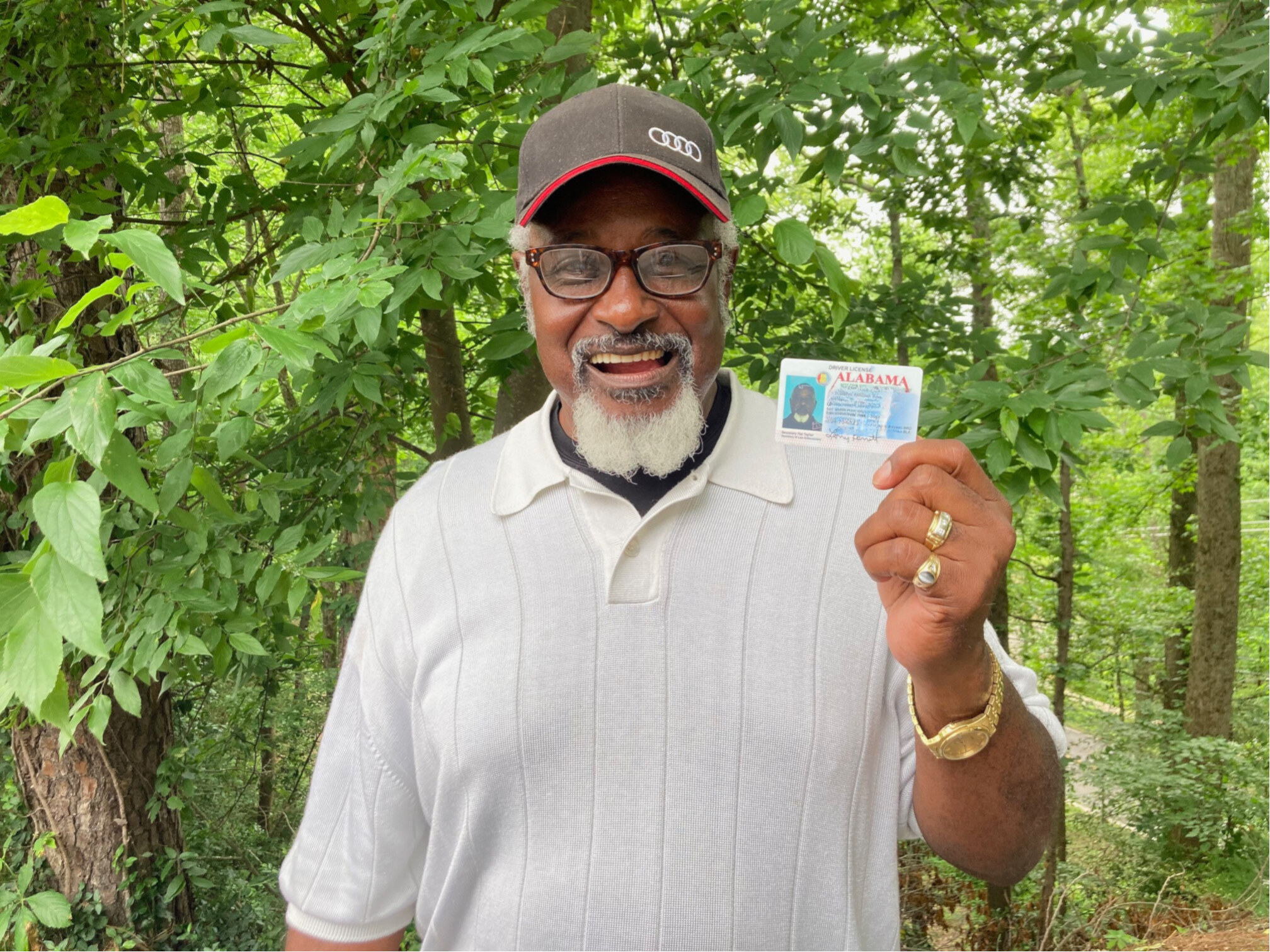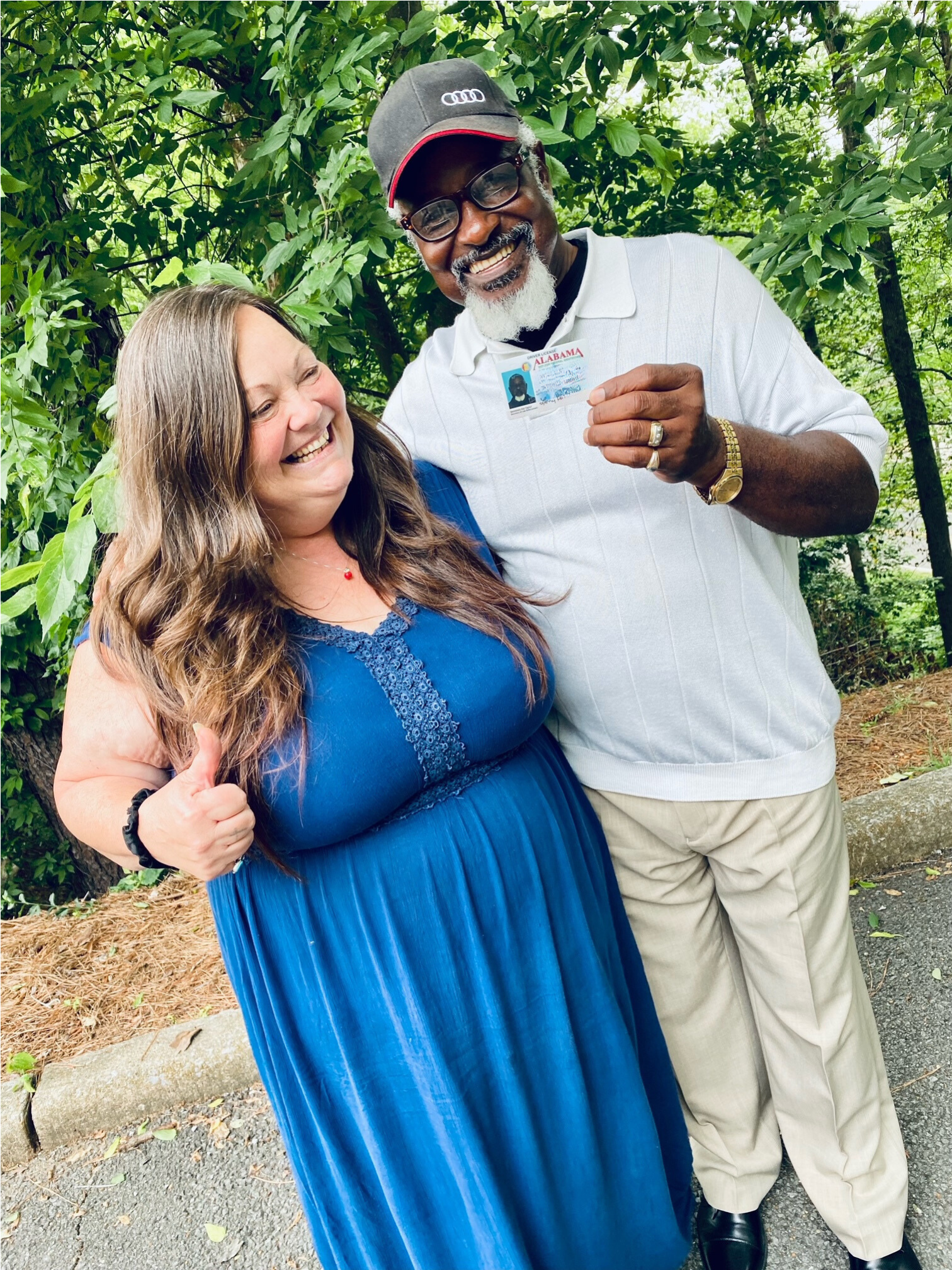Late last year, Larry Garrett was released from Holman Correctional Facility after 38 years of incarceration. It would take more than four months, dozens of phone calls, multiple records requests, and loads of patience to secure the most basic document he needed to move on with his life – his birth certificate. Here is the account of how Appleseed’s Reentry Case Manager Kathleen Henderson made it happen.
By Kathleen Henderson, Appleseed Reentry Case Manager

Larry Garrett proudly holds his new driver’s license
The day after his release, I pick Larry Garrett up from Shepherd’s Fold, a reentry ministry, and take him on the first of many journeys. We gather documents to obtain the felon ID, which he must obtain within 24 hours of release. If he does not carry this card with him at all times for the rest of his life, he is in danger of reincarceration. Alabama is the only state in the nation with this law. We go downtown into the Jefferson County Sheriff’s office and wait. The office is imposing to many who have suffered so much at the hands of the justice system. Larry is feeling uncomfortable, but he is ready with his temporary prison ID and his release papers. This ID is a stark reminder that he committed three felonies and even though he paid with much of his lifetime, he remains marked with a Scarlet Letter and his convictions remain a factor in his daily life. He gets the ID as soon as the officer does the research and takes his photo. Tomorrow, he will apply for a birth certificate. Larry breathes a sigh of relief as this seems much more of a mundane process.
Just one day ago, Larry walked out of Holman prison, after being resentenced from Life Without Parole to time-served. He spent 38 years in prison following convictions for burglary and theft in which no one was physically injured. Larry grew up the oldest boy in an impoverished family in Talladega County; he felt pressure to help feed his siblings, which led to his convictions. Despite his strong family ties, a quirk on his birth certificate almost meant Larry Garrett would never be able to prove who he is.
The application for a birth certificate is simple if you know parental information and where and when you were born. His temporary prison ID serves as a picture ID. We drive to the local health department and Larry applies and waits about 30 minutes for the kind women behind the counter to produce a birth certificate. But he will have to file additional paperwork in Montgomery. His birth certificate was found, and all the information was correct, except his name was not on it. When we ask what name is on it they cannot tell us. She says “it probably just says baby boy.” She shreds the application and gives us the new packet with mailing instructions.
The new packet has different identification requirements. However, at release, Larry was only given a temporary ID, release papers and a few years worth of prison medical records. Thankfully, after several weeks, Larry’s brother finds school records from 7th, 8th and 9th grade and his mothers’ birth certificate. So we send everything we have, every form of ID, every correspondence and after three weeks we are told we will need to provide additional information because it is his name that is missing, and that requires a stricter set of proof. I learn we must provide two of the following:
- Marriage certificate
- State ID
- Birth certificate of a child in which your name is listed as father
- Voter ID card from 5 years ago or better
- Immunization records from 10 years old or better
- DD 214 (the capstone documentation of completed military service)
- Life Insurance policy.
That sounds simple, right? Except Larry has been incarcerated so long that the family keeper of the documents (his mother) has passed away. Also, he has never been married, or had children. He doesn’t possess any state ID except his felony ID and inmate ID. He couldn’t register to vote in prison (many people with felonies cannot restore their right to vote) and no one holds life insurance on him; they always felt he would die behind bars.
This leaves the DD214 and immunization records from 10 years ago. Luckily, Larry is a United States veteran and the Alabama Department of Corrections should have immunization records. Most entities only hold immunization records for five years, and when we explain this to the helpful woman in Montgomery, she says records from five years ago will do. We comb through the records he has been released with and there are only two years worth of medical records. So we file paperwork with the ADOC to obtain the records. After several months – there is still no response. In the meantime we apply for a DD214 and wait. The Veteran’s Services representative takes his prison ID as proof of who he is. After all, it is a state entity.
At this point, Larry begins to feel a bit down. After being locked behind bars for so long and made to feel like a nobody, he still doesn’t exist in our system – at least in the ways required to obtain the most basic form of identification, proof that you were born. He is a veteran and a citizen and yet, this has not been validated. Making mistakes should not negate the fact that Larry is a human being, however, this is how he feels. Furthermore, Larry is energetic, eager to start a job and become self-sufficient, but this bureaucratic hurdle stands in the way of his future.
Believing there must be something that we can do without a birth certificate, we go to the Social Security office and are told that the list of documents has no exceptions. So I begin calling around trying to see if there is anything that can be done. After days of being told no, we visit several offices and are found lacking every time.
Eventually, we speak to someone in the Social Security office who believes she has found the mistake. She sees someone named Larry (his step brother’s name) who was born one year earlier, to the same parents. She believes that is the mistake and we can obtain that birth certificate. We go straight to the Health Department and we receive that birth certificate. However, it says deceased on the front. It appears that this is a half brother of Larry’s that has passed away. We return the birth certificate and begin to wait again.

Reentry Case Manager Kathleen Henderson celebrates with Larry Garrett
We wait and wait, and wait. Weeks pass. We are told to contact the Health Department in the county where Larry was born, perhaps they have some immunization records, so we do and are told they do not have anything for us.
Back to the immunization records quest: After several months, we hear from ADOC that we sent the wrong paperwork, despite using the precise form the agency provided. However, the person in charge of medical records requests provides her direct information and requests that we fax it to expedite our request. We originally applied for the birth certificate on December 20, 2022. More than 90 days later, we received his DD 214 military record. We just need one more document from the list of seven to reach the Holy Grail.
For about the fifth time, I call the Alabama Department of Corrections only to hear that an invoice should have been sent by their contracted medical company more than two weeks ago. This particular ADOC staff member shows some sympathy for this story and incredulity that this has happened. She immediately requests a search by the records clerk. Meanwhile, I make several phone calls to the ADOC medical contractor only to be told that there was no invoice sent and that there is no particular timeline that it would be done. After a week, I call the ADOC back and find that the medical company no longer has a contract with ADOC and we cannot access their database. The frustration builds in both Larry and me.
After more investigation, I find that the elementary school that Larry attended was closed, but the records might have been transferred to another school. So I give that a shot. The administrative assistant says that she has no idea, but connects me to someone who might. There is no answer and no subsequent returned call. I call several more times and reach a voicemail each time. I try researching libraries and health departments to see if maybe they have something and the health departments do not have his records.
We keep researching for another week or more and thinking and calling people and we decide to go try to get a Social Security card with his DD214. It works! Oh mercy, it works! But a Social Security card is not on the list of required documents. After I explained our situation to the employee in the Montgomery birth certificate office, she asked, “Do you have a social security card? I hesitantly said, “We do, we actually do now.” So she said, “Well send me that and the DD214 and I will amend the birth certificate.” You know Larry and I both danced a dance of delight.
And this is how the saga of the birth certificate ends, she did what she promised and within two weeks we received a birth certificate. However, this is only the beginning of great things for Larry Garrett as opportunities abound! He is enrolled in truck driving school and plans to work until he turns 70. After that, he plans to sit in a rocker on the front porch and spend time with the family he so desperately tried to help before he was incarcerated.



